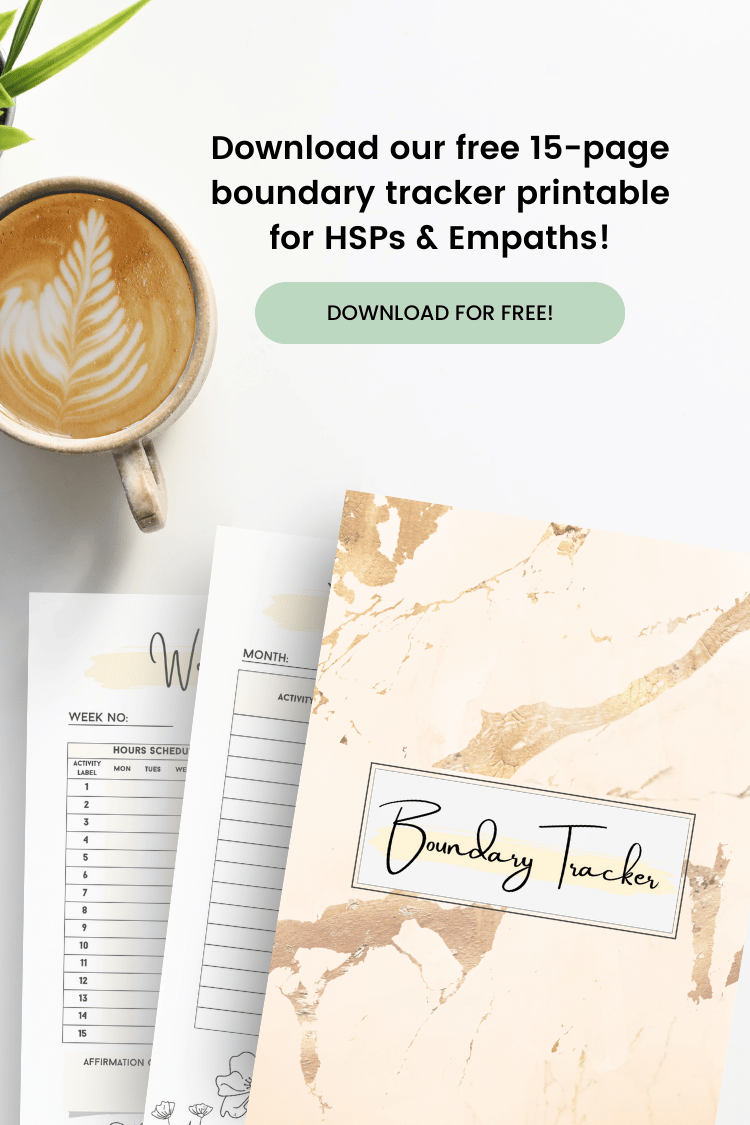Struggling with people crossing your boundaries? Discover how the power of the pause can help you when your boundaries have been crossed!
Estimated reading time: 6 minutes
You know, there’s something incredibly powerful about pausing—taking that small moment before reacting, especially in those tough, unpleasant interactions with others. As a highly sensitive person or empath, I’m sure you’ve experienced that overwhelming urge to respond right away when emotions start to rise, haven’t you? It’s hard not to. Our emotions often feel so intense, almost like a tidal wave crashing over us, making it challenging to keep our cool. And let’s be honest, when you’re dealing with people who are less empathetic, more authoritative, or just straight-up rational and direct, staying grounded can feel like an impossible task.
Over the years, I’ve faced many moments where I’ve had to interact with these types of people. And let me tell you, it’s hard not to blurt out something you might regret or feel disappointed later about what you didn’t say. Either I’d retreat into my shell (something I do quite easily as a Cancer), only to think of the perfect comeback hours later, or I’d react so intensely that I’d feel guilty afterward. I’m pretty sure I’m not alone in this—many highly sensitive people and introverts struggle with these intense situations, where it feels like you’re either being too much or not enough.
So today, I want to share with you what’s helped me over the years to handle these situations more gracefully. These tips have helped me feel less triggered, more in control, and, most importantly, more at peace.
Looking for more personal growth inspiration? Check out our membership for HSPs and empaths!
1. Understand Your Triggers
The first step is understanding why you felt triggered in the first place. When I find myself in these tough interactions, I’ve learned to take a step back—sometimes right after the situation, but more often a day later when all those emotions start bubbling up again. I ask myself: “Why was I triggered?”
Was it something specific that person said? Was it their tone, their body language? Or was it a deeper wound from my past that resurfaced in that moment? Reflecting on these questions helps me separate the current situation from past traumas that might be influencing my reaction. Often, I realize that 90% of my emotional response is tied to something from my past—an experience, an authority figure I couldn’t speak up to as a child, or just an old wound that still hurts.
When you begin to understand that it’s often your inner child being triggered rather than the actual present moment, it makes things feel a bit lighter. It’s not about dismissing your feelings but about giving them the context they deserve. This insight can be incredibly freeing.
2. Embrace the Power of the Pause
Now, this is really the heart of what I want to share: the power of the pause. It’s not always easy, especially when you’re feeling that urge to jump in, to defend yourself, or to make your point heard. But the magic happens when you consciously decide to pause. When someone’s saying something that hits a nerve, instead of immediately reacting, just take a breath.
Listen carefully to what they’re saying. Instead of planning your response while they’re still talking (which we’re all guilty of, aren’t we?), try to be fully present. And when they finish, allow yourself a moment to say, “Let me think about that before I respond.” This gives you the space to process, to check in with your feelings, and to decide how you genuinely want to react. It’s like giving yourself a mini timeout to gather your thoughts.
That little pause not only helps you respond more thoughtfully but also keeps you from saying things you might regret later. It gives you the chance to be more in charge of your energy and the situation, allowing you to communicate more effectively and calmly.
3. Don’t Let Toxic People Walk All Over You
Now, let’s be clear: pausing doesn’t mean you should let toxic people walk all over you. There’s a big difference between staying calm and allowing someone to disrespect or mistreat you. If you find yourself in a situation where someone’s being downright abusive or disrespectful, it’s perfectly okay to say, “I do not tolerate this behavior. Let’s talk later when we can communicate respectfully.” Setting that boundary is essential.
And if you’re struggling with setting boundaries, you’re not alone. This is something we dive deep into in our Ideal Self Plus membership, where systemic coach Julia Zwinz offers guidance on how to create healthy boundaries. We’ve also got a 69-page e-book and four practical worksheets to help you master the art of boundary setting. Sometimes, learning to protect yourself starts with understanding when to step back and say “no more.”
4. Reflect on Your Reactions After the Fact
Let’s be real—sometimes, despite our best efforts, we still react in ways we wish we hadn’t. And that’s okay. It’s part of being human, especially as a highly sensitive empath. When you catch yourself feeling regret or over-analyzing how you handled a situation, take that as an opportunity for growth. Ask yourself: “What could I have done differently?” or “What lesson can I learn from this experience?” This kind of self-reflection helps you handle similar situations better in the future.
As my grandfather used to say, “In der Ruhe liegt die Kraft,” which means “In calmness lies power.” There’s so much wisdom in that saying. When we find that calmness within ourselves, we gain the power to handle any situation with grace and strength.
5. Practice Compassion for Yourself
Lastly, be kind to yourself. We’re all learning, growing, and doing the best we can. Being highly sensitive means you feel things deeply, and that’s a beautiful gift, even if it sometimes feels overwhelming. Embrace that gift, take a breath, and know that every time you pause, reflect, and respond thoughtfully, you’re honoring yourself and your journey.
Embrace the Power of the Pause
Taking a pause might seem like a small thing, but it’s one of the most powerful tools you have as a highly sensitive person. It allows you to stay in control of your emotions, respond with kindness, and protect your own energy in challenging interactions. Remember, your feelings are valid, and taking the time to process them is an act of self-respect.
I’d love to hear your experiences with the power of the pause. Have you ever used this technique in a tough situation? How did it help you? Let’s share and support each other in this journey of learning to pause, reflect, and respond with intention. 💫
In this article, we collaborated with AI, meaning that the input and stories are original human ideas, but the text itself has been created with support from AI. All AI content is being edited and factchecked by our editor.










Great post.
The problem is how do you define disrespect. If I feel this and they do not. How do you make a stand. I’ve done the begging, the silence, the freezing, the shouting, the crying…..now I’m just out of words. But SOOOoo hurt. Over a small action. This person simply uses logic. Finds easiest path possible. Cannot visualise self in others place. Wonder if they are on the spectrum?
Thank you Lilie!
Great question! It is so hard to deal with situations like this, because everyone has different ideas of what feels like disrespect to them and what not. Sometimes if this happens to me and I’ve tried everything and my message/feelings/hurt still isn’t coming across, I make the choice to let go of that relationship. However, with some relationships this approach is easier than with others. For instance, with family ties this can be quite the challenge! In that case, it helped me to learn more about how the other person processes certain situations. But also clearly communicate my boundaries: “If you keep doing X, Y will be the consequence.” And then, of course sticking to that boundary, which is a whole other challenge!